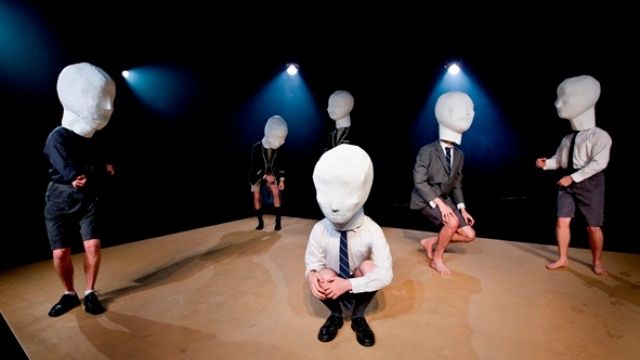Lord of the Flies
Return of the inner-native.
William Golding wrote Lord of the Flies as a novel in 1954, Peter Brook made the movie in 1963 and Nigel Williams adapted the novel for stage in the mid-nineties. In 1983 Golding won the Nobel Prize for Literature and was knighted. An illustrious pedigree indeed.

In the past two years there have been major staging of the play in Scotland and England. The London production had the shell of the burnt aircraft on stage and The Theatre Royal in Glasgow focused on dance to communicate the descent of this band of abandoned boys from their public school cliques into native tribesmen with dark hearts. This is a story that should be told through movement. And it is.
Graceful movement, plus the subtle use of sound and light, create moods and shapes that brew a magical elixir that injects vibrancy to the New Theatre’s production of Lord of the Flies, and are its saving grace. The play is somewhat dialogue heavy and focuses on themes of class and bullying in a post war world obsessed with The Bomb. This Orwellian style rhetoric, whilst still highly relevant today, does feel somewhat archaic in its mode of expression.
 To overcome this director Anthony Skuse invigorates this production with a lightness and innocence, and ultimately terror, through the movement of the ten actors over the various dry and watery planes of the very clever set designed by David Marshall-Martin. The swirling and ever changing patterns of the cast on stage are mesmerizing and place the characters in a land foreign to them and to which they must adapt or die. This is the imperative of the play. It involves the timeless clash between enlightened civilisation and the straightjacket of authoritarianism. Which offers the best way forward? We could be in Homer’s Greece, or Pliny’s Rome, or Hardy’s Wessex. Civilization is in peril.
To overcome this director Anthony Skuse invigorates this production with a lightness and innocence, and ultimately terror, through the movement of the ten actors over the various dry and watery planes of the very clever set designed by David Marshall-Martin. The swirling and ever changing patterns of the cast on stage are mesmerizing and place the characters in a land foreign to them and to which they must adapt or die. This is the imperative of the play. It involves the timeless clash between enlightened civilisation and the straightjacket of authoritarianism. Which offers the best way forward? We could be in Homer’s Greece, or Pliny’s Rome, or Hardy’s Wessex. Civilization is in peril.
The boys’ evolution in their new land entails a descent into a primitive society, ruled by those willing to dominate and do harm to those they wish to exploit. Not unlike England in the fifties. The change in the physicality of the boys, from moving like men to moving like apes, is more beautiful and compelling than any dialogue can convey.
Samuel Rushton as Piggy and Seton Pollock as Jack are outstanding, amidst a very capable cast and crew.
Not to be missed, although I did miss the totem of ‘The Lord of the Flies’.
Stephen Carnell
Photographs © Bob Seary
Subscribe to our E-Newsletter, buy our latest print edition or find a Performing Arts book at Book Nook.

